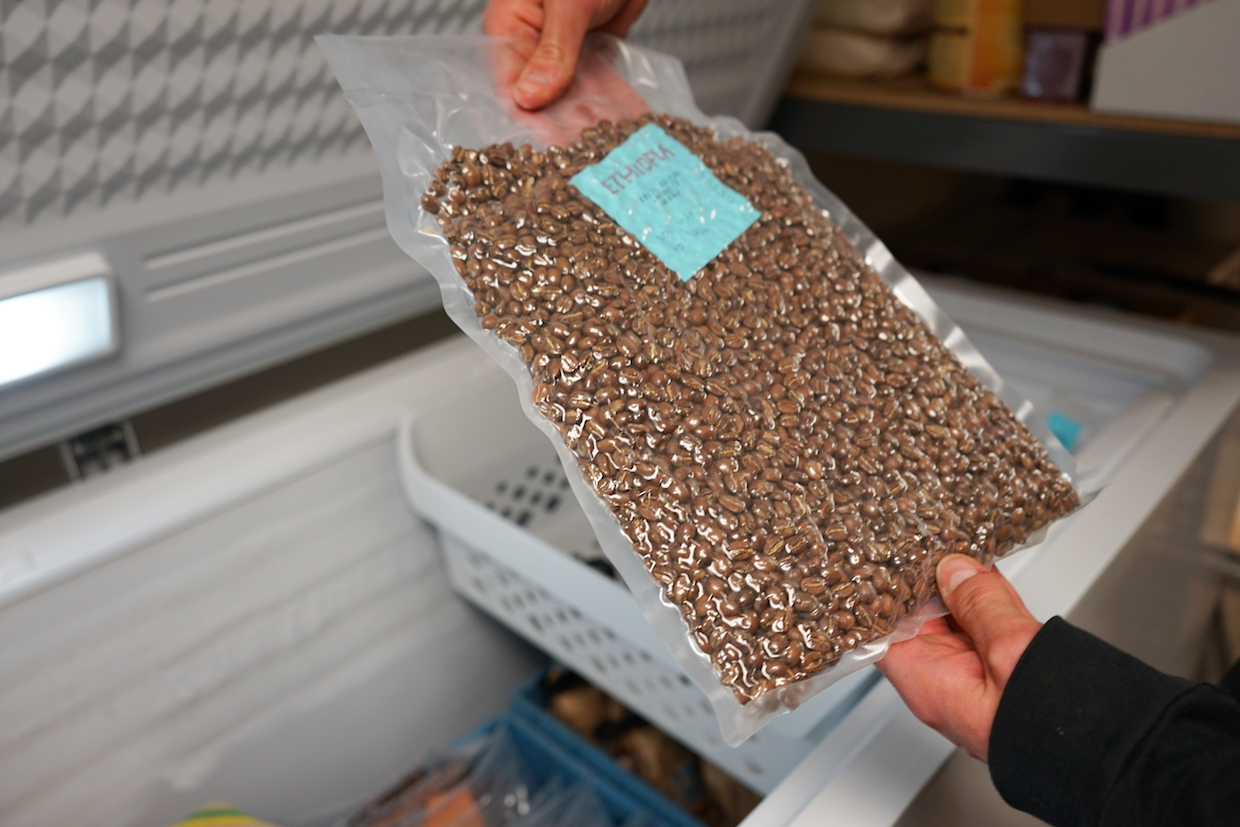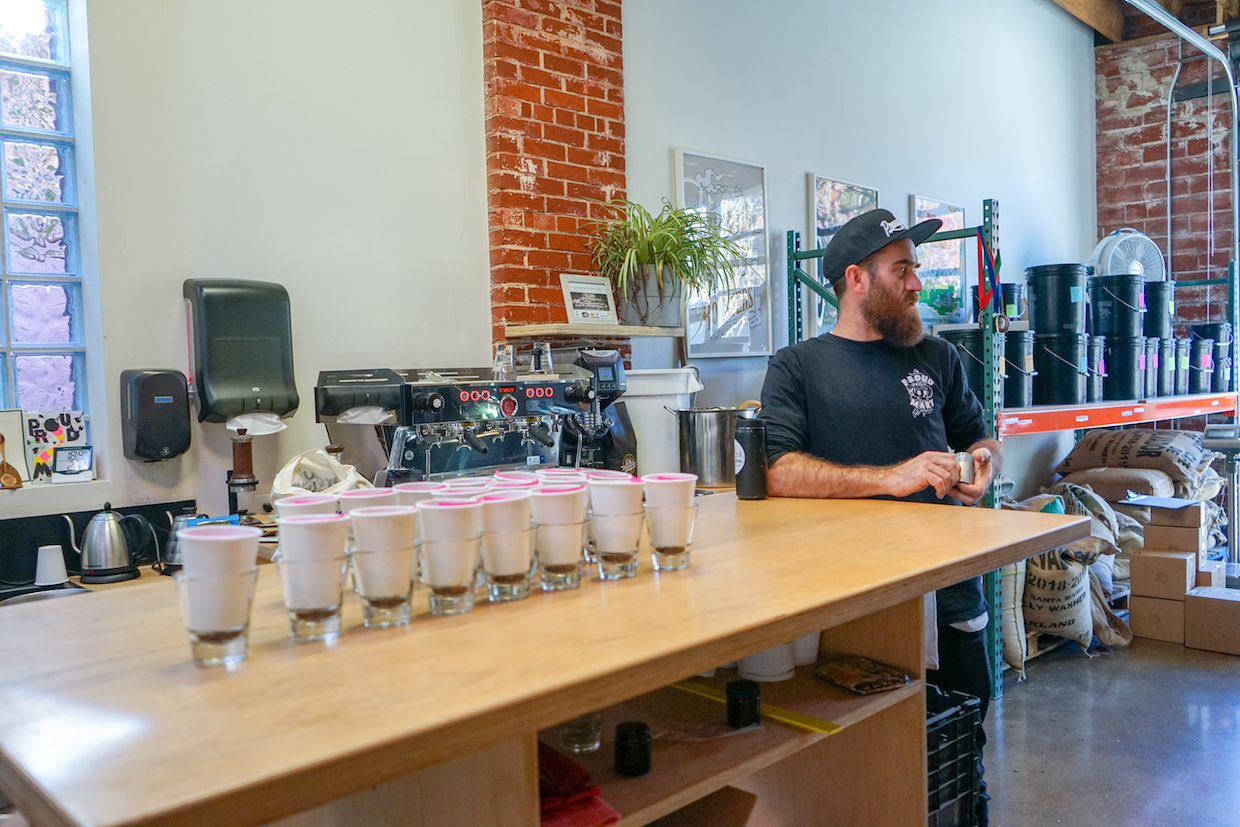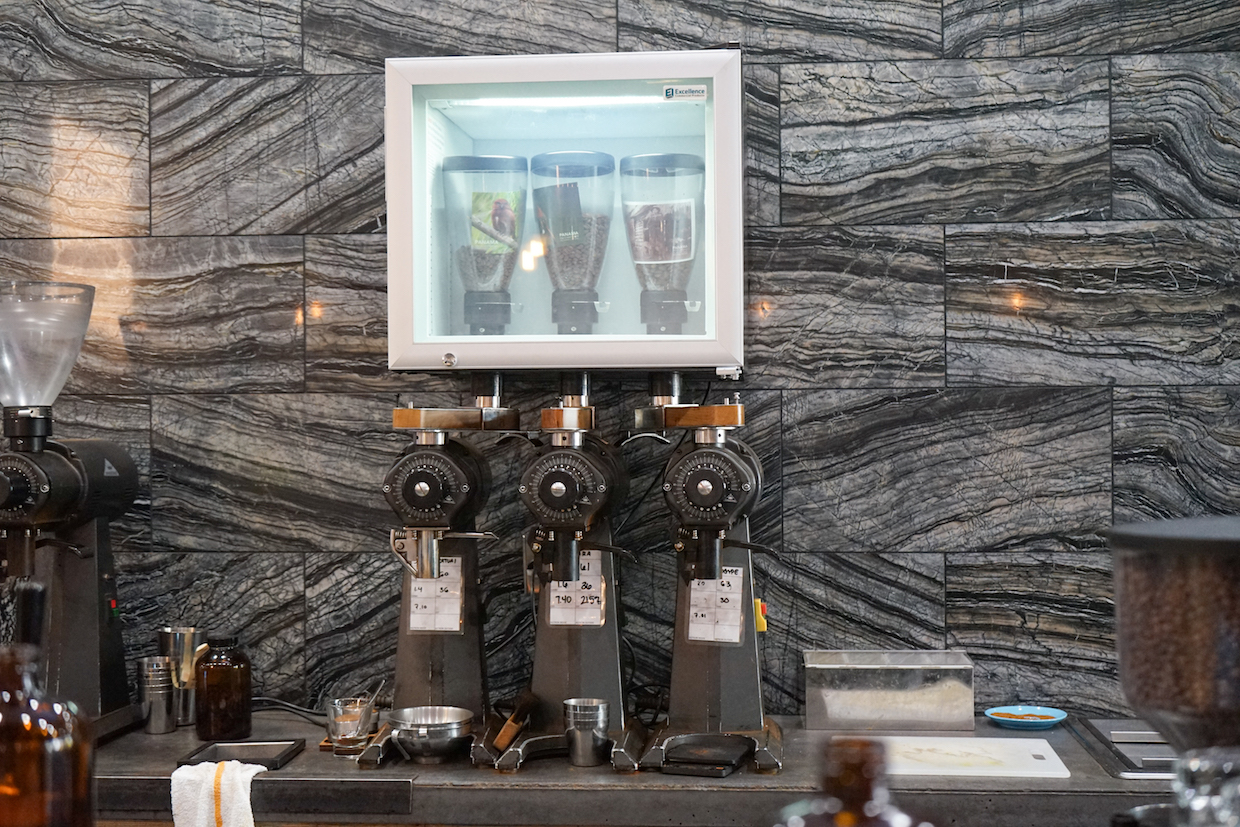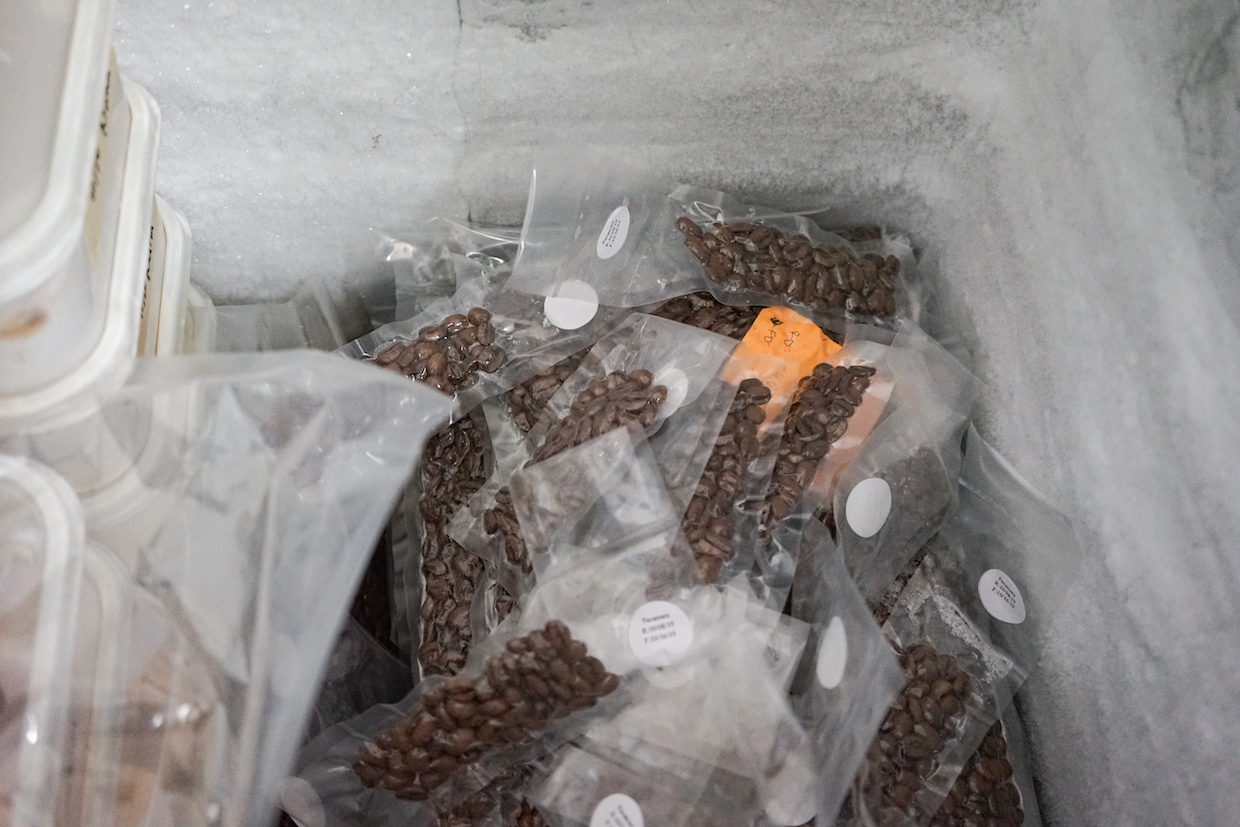
Coffee in freezers at the Proud Mary cafe and roastery in Portland, Oregon. Daily Coffee News photo by Howard Bryman.
For some coffee roasters, the sudden shift to increased coffee consumption at home as opposed to in cafes has come with an unexpected silver lining.
Nolan Hirte and Matt Lounsbury, the founder and senior vice president, respectively, of the Portland-by-way-of-Melbourne company Proud Mary Coffee told Daily Coffee News that they’re seeing an uptick in people willing to pay for the very highest-quality coffees available.
“People want luxury right now,” Lounsbury told DCN. “We’ve got friends that run wine companies that have seen a skyrocket in their higher end stuff. We’ve been selling more deluxe, award-winner, COE [Cup of Excellence]-type coffees than ever before. People just want some goodness.”
The pride Proud Mary takes in its work doesn’t end at its equitable partnerships with growers, or even with the quality of the coffee it sources and roasts. It also extends to coffee freshness, for which the company is willing to go to great lengths to maintain peak quality and consistency.

Nolan Hirte. Daily Coffee News photo by Howard Bryman.
“I feel like coffee has quite a small window where it peaks,” Hirte told DCN. “I’d call it a four- to five-day window where it’s at its best. It’s very hard to only drink that coffee during that window. Because A, we’re not very patient in general, and B, we don’t consume it all in four days. So it hangs around for a few weeks, and you can get a subpar experience more times than you do a good experience. So the opportunity is to create more good experiences, and that’s where this gets interesting.”
Proud Mary freezes all its coffees, both green and roasted. Freezers mounted to the wall above the EK43 grinders behind the bar even keep beans frozen inside hoppers until the moment of the single-dose grind. Proud Mary also doses and vacuum-seals and freezes individual packets of coffee for single-cup brewing and batch brewing.

A custom-built freezer at Proud Mary has coffee frozen in hoppers above the grind chamber. Daily Coffee News photo by Howard Bryman.
With so many people pursuing high-quality fresh roasts at home right now, DCN chatted with Lounsbury and Hirte about the benefits of keeping coffee frozen, and how people can do it effectively in their kitchens or cafes.
What differences do you notice between brewing with beans at peak flavor that have never been frozen, versus beans that were frozen at peak flavor?
Nolan Hirte: I think the biggest impact can be the extraction itself. The frozen beans will shatter into a far more even particle size, so the potential to get a higher extraction is actually easier. I’ve noticed with one of our high-end Brazilian lights we actually got much more clarity and character and flavor from the frozen sample then we did room temp… There’s a reason that the WBC competitors are freezing their coffee. If you’re looking for a little edge, there’s a little edge there.
The negative that I would speak to would be maybe the aromatics off the grind are not as fragrant at first, until the hot water hits it. It feels like there is a slight reduction in the aromatics, but the character in the cup seems to be absolutely still there.
Matt Lounsbury: A year ago I would have been like, “What are you doing? That’s a bad idea.” And I don’t have any science to back that up either. What we do have is some anecdotal evidence so far to the contrary, that says, actually, we’ve tasted these side by side and it tastes better. Be it from the science, or in the particulate, you know, and also just by virtue of preservation, it just tastes better.
When is it best to freeze coffee: As soon as possible off the roast, or after a certain period?
NH: I would let the coffee rest till it’s in between the eight- to 12-day mark. Some people are now actually saying longer; they’re finding their coffee is better beyond two weeks old. Personally, I’m still happy in that eight- to 12-day window. The home consumer can get their 250-gram bag, put it in the [air-tight, vacuum-sealed] container, when it gets to nine days or 10 days or it starts to taste delicious, freeze it. Squeeze the oxygen out, freeze it, when you want some pull it out, scoop it out, put it back. It’s really easy.
ML: The way I’ve adopted this at home is that I bring a 250-gram, regular sized bag home, and I start to get after it when it’s one or two days off roast and it’s good, but it’s really fresh. As it starts to get to that point where I actually would be either worried about going through it all because I’m the only coffee drinker in my household, or it’s aging, or both, is also the point in time I’ll put it in the freezer, in the 12-ounce bag.
So it’s ok to store a whole 12-ounce or larger bag in the freezer and keep pulling it out and opening it and putting it back? Or does that risk trapping too much air and moisture in with the beans?
NH: There’s a risk, for sure. So you need to be quick about it. It’s not ideal, but I guess I’m saying it is possible, man.
The easiest way to make it for a consumer would be potentially a bag clip, like the IKEA bag clip. You need a way to keep the oxygen out. Then they could put a big bag straight in the freezer, and be quick about portioning. We want things to be simple at home, we don’t want to get too complicated. That’ll be the easiest step for everyone and it might encourage people to start doing it. I don’t know that many people are going to have much fun weighing out their bag into single portions; that’ll be the nerdier kind of kids that want to push it a little bit. But very simply, I think a bag clip and just being really quick about getting it out and putting it back in is not a bad place to start for everyone.

Daily Coffee News photo by Howard Bryman.
Beyond just tossing a bag in the freezer, what are some additional steps people can take to really maximize the benefit of freezing coffee at home or in cafes?
NH: If you wanted to level up, then I would suggest argon. Argon gas, you see it in wine bars, some people that are nerdy about wine would have that at home. The tin that we use for really high-end coffee, they actually work really well. I would put the Geisha in a 100-gram tin in the freezer; I would pull it out, open it up, scoop out my 15 grams, squirt in some argon, put the lid back on, put it back in the freezer, and that works really, really well.
We don’t want to encourage more plastic, but there are bags coming out of New Zealand and the UK that are 100% biodegradable and food based. That would be the gold standard. Vacuum-seal it at home into portions, and pull out a portion and off you go. That will keep like that for easily six months, if not longer, in a normal freezer. However, if you don’t have a vacuum sealer or you’re not into even the “eco” kind of plastic, then little glass jars, or these two-ounce tins are the next best thing. It holds about 15, 16 grams of coffee, which is perfect for one portion, so there’s not a lot of headroom in it.
ML: The [Planetary Design Airscape Bucket Insert] are what we use. The Miir [Coffee Canister] and others for home are like the [Planetary Design] ceramic; they’re probably the better storage vessel even if you weren’t putting it in the freezer. But we’re taking it one step further. We’re working on a design right now that we’d rather not share with the world just yet. One that is meant to be put in the freezer — that would go with potentially with every bag.
So, in your opinion, is freezing coffee universally better than not freezing it, as long as it’s sealed well enough? Are there any other caveats or ways you can screw it up?
ML: One clarification I found around here is that we go straight from the freezer to the grinder. Not letting it sit around and get warm or room temperature, not treating it like a piece of meat that you would thaw out. That may be a little bit of a shift as it pertains to coffee.
What about coffee inspires you most?
NH: For me, it’s the people behind the coffee. It’s so cool that [people at origin] are as passionate and in love about trying to make something special happen, the same on this end — the roasters, the baristas, the community. I love that we get to work so closely with people on this product. That’s kind of what makes it special.
ML: What got me into coffee was the idea of what’s possible. I mean, I was around in the early days of Portland when it was like, wait, what? You’re doing what? I met Dwayne [Sorenson] and the staff at Stumptown, it was only one cafe at the time, and then they were doing latte art; I’d never seen that before… I had a break from coffee and I was more or less retired, but then I met Nolan. And I was like, okay, you guys are buying from producers, doing all the direct trade stuff, that’s great, but you’re also doing all this other stuff like anaerobic fermentation? You’re encouraging producers to do that, and they’re getting paid more for it. Now that’s interesting. You’re freezing coffee — wait, what? You’re selling Geisha for $12 a cup, instead of just $300 a bag that no one buys? I get excited about that…
I’ve been in this industry long enough to where everyone in the beginning was like, ‘Oh yeah, it’s gonna be like wine.’ Well guess what? That analogy didn’t really hold up. Third Wave mission accomplished, people pay a little bit more for coffee, they’ll care about where it comes from, but they’re not really into the idea of taking it as seriously as some people take their food. Whereas the Australians, you can get a good cup of coffee at almost every restaurant, and on the flipside, you can get an amazing food experience in almost every single coffee bar in Melbourne. This dude [gestures to Nolan] and a few other folks kind of put that on the map, and that’s inspiring for me.
What about coffee troubles you most?
NH: The price and the sustainability around it. Commodity coffee does not taste good. So the only solution to the sustainability of coffee itself is for us all to pay what it’s really worth… What is coffee really worth? How much does it really mean to you? Do you really fucking care? If you really care, then let’s pay for it. Because that’s the only way that we can trickle that back to the producers and actually buy more of their specialty coffee.
I’m really frustrated at wholesale right now. Like, I’m not in the business to buy cheap coffee and sell cheap coffee; I’m not interested in it, and people will keep asking me for cheap coffee that tastes good. Sorry, but man, that’s not how it works. The really good stuff has had a lot of love and attention and care into it. And it was a big investment by the producer. And what happens is, we find that we don’t have a very big audience of operators that are happy to spend money on that coffee, and the reason is that there’s fear around charging the consumer more money and losing business. So the answer, to me, is: Charge more money. Stick your neck out. Buy something special. We’ve switched gears to really focus more on direct-to-consumer because there’s an opportunity to raise that bar.
What would you be doing if it were not for coffee?
NH: Before I fell back in coffee, I was setting up a nonprofit community-based radio station from my house, and I was trying to encourage unity through the community. There were three or four different Aboriginal communities that had moved back to my town. I didn’t realize this, but where I grew up in the Pilbara in Western Australia, it was an all-white community. That seemed perfectly normal to me growing up, and then when I moved back to that town, I was 21 years old, and there were several different Aboriginal communities around the town, not living in the town but living around the town.
I had to ask my mom, why was there no Aboriginal people when we were growing up? And her response was that in the 1950’s, they were all rounded up and taken to the coast. So they were pushed away, and I guess for me, I really liked the idea of trying to offer something to that community. I was looking at the youth and the children that were growing up and how they were listening to AM radio and that meant top 40 was all they were hearing. I was really into inspiring them with drum and bass, dub, reggae, trance, and with any different type of music that would give them access to. So, definitely there’s a creative outlet in me that would find something like that to do.
ML: A lot of the friends that I have, we start and end our group rides, we do bike rides, we do different types of group fitness activities that start and end with coffee, or a meal or a beverage, and there’s nothing that really ties that all together. I have a dream of someday making that happen. Whether that looks almost like a version of the YMCA with really cool coffee and food. Imagine what that could look like, and that we could all benefit from. That’s one of my passion projects.
Howard Bryman
Howard Bryman is the associate editor of Daily Coffee News by Roast Magazine. He is based in Portland, Oregon.
Comment
5 Comments
Comments are closed.






Nearly 10 million people have applied for unemployment in the US in the last 2 weeks alone, with food service being among the hardest hit industries. Coffee growers are facing closed borders or mills being closed because of the pandemic. Beyond the ongoing threat to everyone’s health, coronavirus is going to set off a long-lasting global depression hurting most people’s livelihoods for years to come.
So saying “people want luxury right now” feels both short-sighted and insensitive.
We bring 30-40 pounds of coffee to the US from our Certified family farm near Medellin, Colombia. It has always gone into our freezer. We sold roasted beans and grounds in the early 90’s and always stored our coffee in the freezer. It stays fresh to drink. Cafe El Pedral, Betania, Antioquia.
Please don’t post such negative comments as above. There is no room for negatives in forums, and if you disagree, go to the thousands of others where people ridicule each other and toss insults randomly. Almost all of us want to “taste” something finer on many occasions. I look at Catholic churches at times, churches in very poor surroundings and circumstances. Locals go there. Why? Everyone wants to touch velvet in their lives. Excess in some way is often good for our being. If this forum offers your degrading concepts again, you will see me leave. Please don’t reply to this or post other unnecessarily downsided comments. You have proven yourself “both short-sighted and insensitive”. Howard Bryman, thank you for your work on this article.
The article was great. An informative interview that goes beyond the technicalities of preserving the ‘peak falvor’. Thank you for creating engaging content, Howard.
I have to disagree with Carlton. Focusing primarily on ‘luxury’ CAN very easily seem short-sighted and at times like these insensitive, and that point had to be made. I doubt that it’s a common belief that charging more is virtue onto itself, let alone that it should be encouraged as ‘sticking your neck out’. Again, this is drop in a bucket, a broader discussion.
Calling an opinion ‘unnecessarily downsided’ or equating valid criticisms to ‘degrading concepts’ is just lazy. It’s called a forum for a reason.
Stay safe!
Is there any negative impact on the grinder’s burrs, when grinding frozen beans?